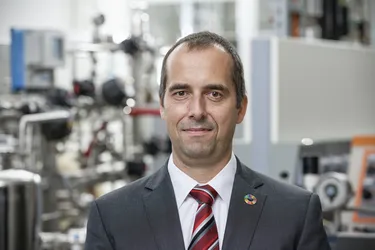Group Leader Systems Biology

Office hours: no special times defined
E-Mail: norbert.mehlmer@tum.de
Phone: +49 (89) 289 13257
Address: Technical University of Munich, Department of Chemistry, Werner Siemens-Chair of Synthetic Biotechnology (WSSB), Lichtenbergstr. 4, 85748 Garching, Germany
Room: CH6, Room 36207
Main research areas
The focus of the research will combine different aspects of systems biology with applied and basic research on biotechnology. This will allow comprehensive insights into complete fermentative processes and enables the identification of bottlenecks in recombinant and natural production hosts. Systems biology is the key for understanding and predicting metabolic pathways by fitting recombinant pathways into cellular processes which are influenced by internal and external stimuli. The comprehensive analysis of metabolic fluxes together with the expression analysis (proteome and transcriptome) allows knowledge-based manipulation of microbial hosts and the design of user-defined microbial production hosts. In this respect, we would like to widen our current scientific borders at the TUM by establishing new platform organisms. In the BMBF call “Mikrobielle Biofabriken für die industrielle Bioökonomie − Neuartige Plattformorganismen für innovative Produkte und nachhaltige Bioprozesse” the project “OleoBuild” aims to establish unexplored pro- and eukaryotic microorganisms for the production of hydrophilic compounds. The sustainable biotechnological production of these compounds with conventional microbial production platforms is inefficient due to the low tolerance of these compounds regarding elevated concentrations of hydrophobic compounds in their extracellular or intracellular space. Therefore, pertinent microorganisms must have the capability to provide hydrophilic compartments as natural sink. Main challenges in this project will be the establishment of new metabolic pathways by manipulating the endogenous pathways with recombinant techniques and subsequent metabolic optimisation. In the "BigPharm" project, tools from systems biology are also used to develop new biocatalytic synthesis pathways for the sustainable and scalable production of cannabinoids.
Curriculum vitae
Jul. 2018 – present Technical University of Munich (group leader, Privatdozent)
- Main topic: Synthetic biotechnology with a focus on systems biology and synthetic chassis design, Prof. Brück
- Projects: OleoBuild, BigPharm and InViDetect
Apr. 2016 – Jun. 2018 Technical University of Munich (project leader and manager)
- Project: New PHB-based plastics, Prof. Brück
Dec. 2013 – Mar. 2016 Technical University of Munich (postdoc, project manager)
- Project: Sustainable production of new bioinsecticides, Prof. Brück
Feb. 2013 – Mar. 2013 LMU Munich, research associate (postdoc)
- Project: Characterization of chloroplastic Ca2+-binding proteins, group Prof. Vothknecht
Aug. 2012 – Jan. 2013 University of Vienna, project manager (postdoc)
- Project: Identification of novel Ca2+ signaling pathways in chloroplasts, group Prof. Weckwerth
Jul. 2011 – Feb. 2012 LMU Munich, project scholarship: Schrödinger postdoc-fellowship (postdoc)
- Project: Identification of novel Ca2+ signaling pathways in chloroplasts, group Prof. Vothknecht
Aug. 2010 – Jan. 2011 LMU Munich, research associate (postdoc)
- Project: Evaluation and establishment of Ca2+ dependent interaction networks by protein microarrays, group Prof. Vothknecht.
Feb. 2009 – Jul. 2010 LMU Munich, research associate (postdoc)
- Project: Generation of transgenic AEQ reporter lines, group Prof. Vothknecht
Nov. 2004 – Jan. 2009 Max F. Perutz Laboratories at the University of Vienna (PhD)
- Project: Ca2+ Dependent Protein Kinases in Arabidopsis thaliana, group Prof. Teige
May. 2004 – Jul. 2004 University of Salzburg, research associate
- Project: Structural modelling of the ribosomal proteins rpS6 and rpL10 [32], group Prof. Breitenbach-Koller
Nov. 2002 – Aug. 2003 Max Planck Institute for Molecular Genetics Berlin, MSc research (diploma thesis)
- Project: Identification of b-synuclein and g-synuclein interacting proteins, Department of Vertebrate Genomics (Prof. Lehrach), group Dr. Krobitsch